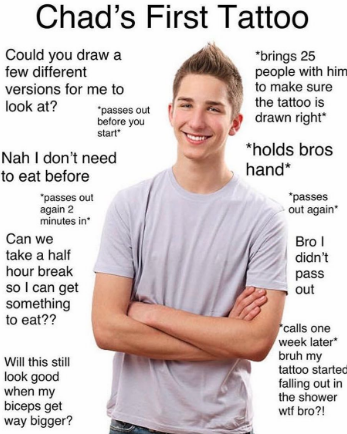Study Says We’re Reckless, I Say We’re Smart
Study Says We’re Reckless, I Say We’re Smart
Another day, another silly study to come out. According to some new findings out of Canada, people with visible tattoos are more reckless and impulsive than our non- and non-visibly tattooed friends.
To that I say…. HA!
We just know how to have a good time! Just look at the blast we had on our inaugural Texas Inked Cruise:
In all seriousness, this is only one study from a small sample size that has yet to be replicated, and I have a couple of bones to pick with it:
They had a small, skewed sample group
“A total of 781 people without tattoos and 255 with tattoos, 68 of which were still visible when clothed, were assessed for the research.”
That’s hardly a large enough sampling to make any meaningful conclusions, but I’d also like to point out that your sampling should align with the general population. According to most findings, roughly 38% of adults have at least 1 tattoo. That would mean this study should have closer to 400 tattooed participants to be an approximation of the overall ratio of tattooed to non-tattooed people.
The study had people making financial decisions, and little else.
I don’t know about you, but financial literacy and impulsiveness are not one-and-the-same. I couldn’t find any data on how these people were selected or their backgrounds. They could have very well just found 68 visibly tattooed people that were bad at math.
The authors of the study seemingly had biases against tattoos before they even began.
Just read this quote from one of the researchers:
“Tattoos are about making some kind of statement. But why not just dye your hair or get a personalized T-shirt you can remove?”
There’s a concept called Confirmation Bias that essentially says that people prefer evidence that supports their already formed ideas, rather than viewing all evidence objectively. If you want to set out to prove that you’re somehow better than people with tattoos - you’re going to find evidence to support that conclusion. But that evidence must be taken with all other facts as well for a better view of the whole picture.
Correlation does not equal causality!!
As someone who loves science and data, I find myself wanting to scream the above statement from the rooftops constantly! This study only compared a small set of data points. Just because the ability to plan for long term decisions and amount of tattoos people had lined up in this one instance does not mean that they always will! You have so much else to consider, like could there be other factors at play? If so, can we rule them out? Can we prove that the inverse of these findings are also true, that people with no tattoos consistently make better decisions? This is why the most important step of the scientific method is to REPEAT. If you can’t replicate findings, then your findings weren’t as solid as you thought they were.
Good tattoos are all about preparing for the future
The biggest problem I have with this study is simply the ignorance on behalf of the research team. If they took just a bit of time to do some investigating or even, gasp, talked to some artists, they would know how much of a time and monetary investment tattoos can be. It can take months, even YEARS to get in with top artists for an appointment that takes hours and costs more than the down payment on your vehicle. Good body art takes patience, thoughtfulness and planning.






















